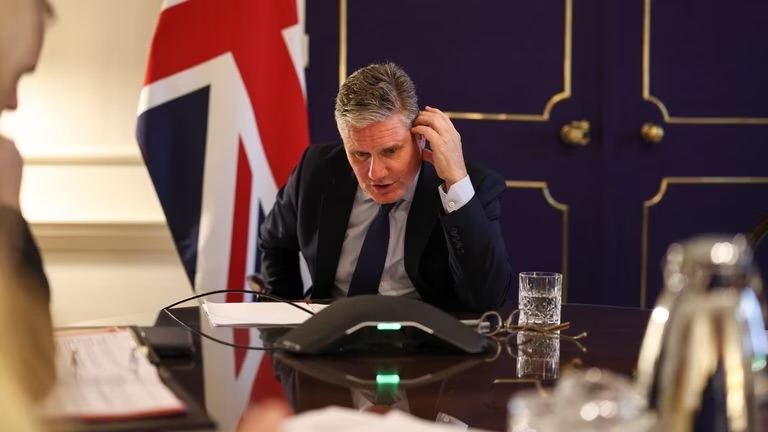Breaking
Sir Keir Starmer Engages in Rare Diplomatic Call with Iran’s President Amid Rising Middle East Tensions

In a significant diplomatic move, UK Prime Minister Sir Keir Starmer engaged in a rare 30-minute phone conversation with Iran’s President Masoud Pezeshkian, signaling the UK’s active role in international efforts to mitigate escalating tensions in the Middle East.
This call follows a joint statement issued by the UK, US, France, and Germany, which urged Iran and its regional allies to de-escalate threats of military action against Israel.
The growing concern in Western capitals stems from the potential for Iranian retaliation following the assassination of Hamas leader Ismail Haniyeh, an event that has heightened fears of a broader conflict in the region. In response to these developments, the United States has already ordered the deployment of a guided missile submarine to the Middle East, underscoring the gravity of the situation.
During the conversation, Sir Keir expressed deep concern over the escalating tensions, urging all parties involved to prioritize de-escalation and avoid further regional confrontation. According to a Downing Street readout of the conversation, Starmer emphasized the “serious risk of miscalculation” in the current volatile environment, stressing that “now was the time for calm and careful consideration.”
READ ALSO:15-Year-Old American Loses Leg in Belize Shark Attack
The Prime Minister specifically called on Iran to refrain from any military action against Israel, asserting that such a move would not serve the interests of any party involved. “War is not in anyone’s interests,” Starmer reportedly told Pezeshkian, underscoring the need for a peaceful resolution through diplomatic channels.
Starmer also reaffirmed his commitment to an immediate ceasefire, the release of all hostages, and an increase in humanitarian aid to Gaza. “The focus should be on diplomatic negotiations to achieve these outcomes,” he added, highlighting the importance of dialogue over conflict.
The issue of foreign detainees in Iran was also raised during the call, with both leaders agreeing that constructive dialogue was in the best interests of their respective countries. The Prime Minister, however, made it clear that such dialogue could only be furthered if Iran ceased its destabilizing actions, including threats against individuals in the UK and its continued support of Russia’s invasion of Ukraine.
Downing Street’s readout further stated that Sir Keir’s call with Pezeshkian is a “very rare occurrence,” reflecting the significance of the current crisis and the value of maintaining diplomatic channels with Tehran. The presence of a British embassy in Tehran, a diplomatic advantage not shared by many Western nations, including the United States, has enabled the UK to directly convey its concerns and push for de-escalation.
Sky News’ Middle East correspondent, Alistair Bunkall, noted that the call demonstrates the UK’s strategic use of diplomacy as a means to influence Iran at a critical juncture. “This call shows the value of having a British embassy in Tehran,” Bunkall said, adding that Starmer’s message to Iran echoed the broader Western approach of using diplomatic incentives as a “carrot” to pull Iran back from the brink of conflict.
Bunkall elaborated on the significance of the call, stating that Western leaders are pushing for a ceasefire deal, with talks scheduled to take place on Thursday. He warned that any aggressive action by Iran in the interim could jeopardize these crucial negotiations. “Anything that you do in between that, or even after that, runs the risk of collapsing those talks,” Bunkall explained, underscoring the delicate balance of the situation.
The joint statement issued earlier by the UK, US, France, Germany, and Italy emphasized the urgency of the situation, stating that there was “no further time to lose” in reaching a ceasefire and securing the release of the remaining hostages in Gaza. This coordinated effort by Western powers highlights the international community’s recognition of the potential for a broader conflict if the current tensions are not carefully managed.
As the world watches the developments in the Middle East with bated breath, the UK’s proactive engagement with Iran marks a pivotal moment in the ongoing diplomatic efforts to prevent a full-scale regional war. Sir Keir Starmer’s call to Iran’s president is a testament to the UK’s commitment to peace and stability in the region, even as the threat of conflict looms large.

















